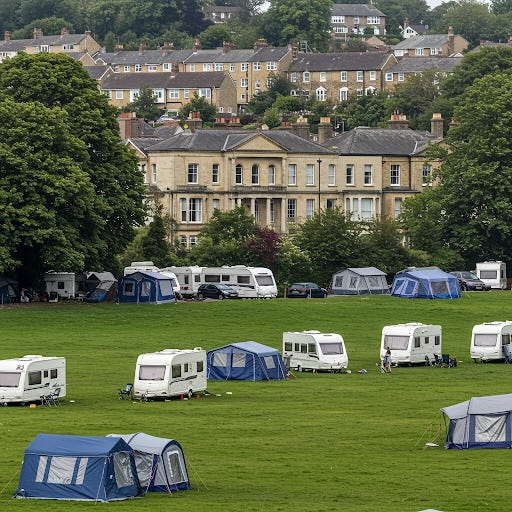'Not in Our Back Gardens!' Bristol's Well-Heeled Wring Hands Over The Up's And Downs Of Downs Dwellers.
Residents' Knickers in a Twist as Council Ponders Policy That Could Take a Year. Though, which year exactly?
Well, to be honest, I was actually going to scribe about my experience with the local hospital, and how, after three months, my complaint was taken up about discontinued telephone numbers I was referred to, and other such matters of significance to me. When, earlier this afternoon, I received a call from a very apologetic line manager who assured me that every error on the hospital’s part has now been corrected, and those responsible have been metaphorically spanked within an inch of their lives.
Except for one minor, overlooked detail that would have made my day. Compensation. Not that I’m after any financial recompense, of course. No. I was thinking more along the lines of shopping vouchers. Or, at a stretch, a free and complimentary colon transplant, if ever the need arose at any point in the future. Instead, however, my gaze was yet again distracted by, take a guess. Go on, I dare you!
Not got it? Damn, you’re surprisingly slow today. Okay, think of a colour, and then think of a political party, like here, in Bristol. Right then, here’s a headline from today’s Bristol Post -
“Hundreds call for quicker action to remove Downs caravans during heated meeting.”
“There was anger and frustration outside and inside a public meeting on Monday (March 24), as people living around the Downs packed into a church to call on council chiefs to do more about the issue of people living in vans and caravans on the famous Bristol green space.” Yes, GREEN!
A veritable symphony of outrage filled St Alban's Church in Westbury Park, though not all attendees were inside to enjoy the performance. Around 150 individuals, denied entry to the packed venue, found themselves relegated to the cheap seats of the churchyard, their collective blood pressure rising faster than the property values in their leafy postcodes. The object of their collective ire? The increasing number of caravans choosing to park up on Bristol's precious Downs, a patch of green so jealously guarded, you'd think it was paved with gold bullion rather than grass.
The evening's entertainment began with a cameo from Councillor Barry Parsons, chair of Bristol City Council's homes and housing delivery committee, who braved the baying crowd outside. He was met with the kind of warm welcome usually reserved for tax inspectors or parking wardens. Residents of Sneyd Park, Westbury Park, and Stoke Bishop – areas where the average house price could make your eyes water – regaled him with tales of woe, no doubt delivered with the delicate tones of those who've never had to worry about the price of a pint of milk.
Inside the church, where approximately 450 souls had managed to squeeze in, the atmosphere was only marginally less fraught. Cllr Parsons, facing a room full of furious council taxpayers, declined to offer the instant gratification they so clearly craved. Instead, he unveiled the council's grand plan: a new policy to address the van-dweller issue. The catch? It might take a year to implement. One could almost hear the collective intake of breath – a year! In the hallowed halls of Westbury Park, that's practically an eternity.
Cllr Parsons (Green, Easton), supported by his sidekick for the evening, Cllr Richard Eddy (Conservative, Bishopsworth), found himself sharing the stage with local Conservative luminaries and the formidable Alan Jenkinson and Steve Small, both from the Sneyd Park Residents Association and the Downs Advisory Panel. The latter group, one suspects, are not known for their love of impromptu roadside communities.
Cllr Parsons explained that Bristol's housing crisis, exacerbated by the pandemic, had led to a veritable explosion in the number of people living in vans and caravans. The figures, he revealed, were quite startling: from an estimated 150 vehicles in 2019 to a staggering 640-680 today. And the Downs, that sacred space co-managed by the council and the Society of Merchant Venturers (a group whose name alone suggests a certain level of historical privilege), now plays host to around 60-70 of these mobile abodes.
Both Cllr Parsons and Cllr Eddy pointed fingers at the previous Labour administration, accusing them of the political equivalent of sweeping the problem under the rug. The new administration, they declared, was finally going to sort it out. This was, of course, met with the kind of scepticism usually reserved for politicians' promises.
The meeting, billed as an opportunity for residents to vent their spleens, certainly delivered on that front. Speaker after speaker took to the floor, their voices dripping with a mixture of concern and thinly veiled disdain. Hygiene, health, and environmental issues were the order of the day. Tales of encountering human excrement in the bushes (a particularly popular theme) were shared with dramatic flair. One mother, overcome with emotion (or perhaps the sheer horror of it all), described how her children were terrified of the "intimidating" caravan encampments.
Mike Huggins, a Stoke Bishop resident and former environmental health inspector for Bristol City Council, delivered a particularly scathing assessment. He accused the council of failing in its statutory duty to address the "unacceptable" sanitary conditions, the lack of basic amenities, and the fire hazard posed by caravans parked "nose-to-tail." "It's about time we started action rather than words," he declared, to rapturous applause from the assembled gentry.
Samantha, a Westbury Park resident who claimed to have volunteered for a homeless charity (a fact likely intended to demonstrate her moral high ground), bemoaned the unpleasantness of her dogs encountering human waste. She then posed the rhetorical question that was no doubt on everyone's lips: "Why can't Bristol, with all its leading minds on innovation in housing, do more, more quickly?" The implicit answer, of course, being that the leading minds were, at that very moment, stuck in a church hall trying to appease a room full of angry homeowners.
As the evening wore on, Cllr Parsons' responses were met with increasing levels of exasperation and, on occasion, outright laughter. Brian Hogan, a Stoke Bishop resident, summed up the general sentiment: "You're doing really very little – why? It's going to grow and grow. Are you doing anything at all on this? You're not doing anything at all other than talking about it."
The latest figures reveal that Bristol holds the dubious honour of having the highest number of van and caravan dwellers in the country. While they are scattered across the city, their presence on the Downs has clearly struck a nerve with the residents of the surrounding affluent enclaves.
An enforcement officer for Bristol City Council, who also happened to live nearby, suggested a simple solution: a Public Space Protection Order or a byelaw to outlaw overnight parking on the Downs. He then pointed out the potential hypocrisy of the situation, noting that any Gypsy, Roma, and Traveller communities arriving on the Downs would be moved on swiftly, while the current residents were allowed to remain. "That is just racism," he declared, a statement that no doubt added a layer of discomfort to the already tense atmosphere. Clearly oblivious of the fact that van dwellers are not a race.
The possibility of residents withholding their council tax was also raised, with one individual claiming that there was "around £3 million of council tax sitting in this church right now" – a threat that, while likely hyperbolic, certainly conveyed the depth of feeling in the room.
Amidst the chorus of complaints, a few voices of reason emerged. Flora, a van dweller who lived nearby but not on the Downs, urged attendees to remember that "it's not a vehicle, it's a person inside that vehicle." She also acknowledged that the actions of some van dwellers were "tarring everyone with the same brush," adding that people living in vans weren't doing so by choice.
Cllr John Goulandris (Con, Stoke Bishop), perhaps sensing the mood of the room, called for immediate action. "We don't want talking, we want action," he thundered, to cheers from the assembled masses.
Other residents demanded that the council at least clear the rubbish on the Downs and remove abandoned caravans. Former city councillor Sharon Scott weighed in, recalling that she had received weekly complaints about the issue during her time in office. She reiterated the suggestion of a no-overnight-parking bylaw and the identification of alternative sites for van dwellers, stating that "the Downs were left for the people of Bristol to enjoy; they were never intended to be used in this way."
In the end, the meeting served as a potent reminder of the complex and often fraught relationship between housing, class, and public space in Bristol. While the residents of Sneyd Park, Westbury Park, and Stoke Bishop may have left the church with their concerns aired, the issue of what to do with Bristol's growing population of van dwellers remains as thorny as ever. And the council's promise of a policy in a year's time? Well, in the words of one resident, it's "really very little."



